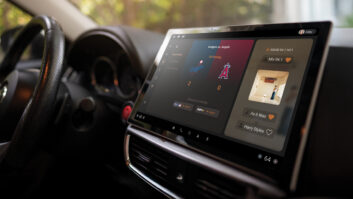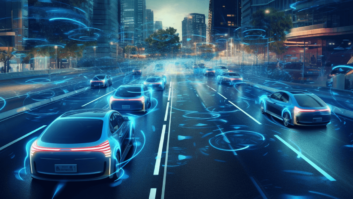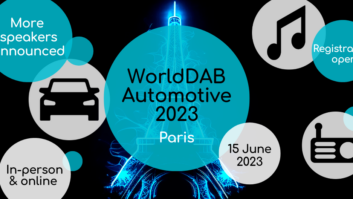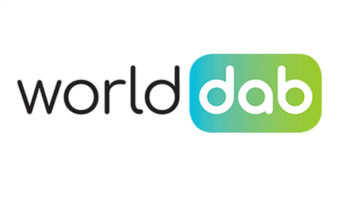This is one in a series of articles about radio’s role and future in the evolving automobile dashboard. To read more, visit https://www.radioworld.com/dashboard.

An iHeartRadio app is shown on a Mercedes CLA45 with a concept infotainment system and digital instrument cluster created by QNX Software Systems to showcase what automotive companies can do with the QNX systems. The connected car isn’t coming. It’s here.
Discussions in the automotive industry ecosystem have moved well past debates about whether customers really want to connect their smartphones to their cars, and on to talks about the vehicle as the “most capable wearable” device.
Listening to conversations around the recent Telematics Detroit show felt a bit like picking up an earlyiPhone — not only are the new infotainment platforms driving rapid changes in the automotive industry, they are affecting every other industry that interacts with the consumer in the car, from pizza to insurance.
Connected consumers now simply expect to have connected cars that allow them to carry on their connected lifestyles everywhere they go. And they have little patience for stale technology that doesn’t function well. After all, you can get a new phone every few months and new apps any time; why should your car be different?
Synchronizing these expectations with traditional car manufacturing is tricky.
Car manufacturers and their suppliers are racing to adjust to this new pace, but they’re not the only ones taking notice. Tech giants like Google and Apple have started developing solutions as well, and there was a great deal of speculation at the show about what the results might be. Will tomorrow’s car be a collaboration between the car companies and Google? Will Apple simply end up owning the user experience?
As the battle for the in-vehicle consumer shapes up, the platform continues to evolve. In-vehicle systems have to be easy to use, and not every new infotainment system is getting this right. The old-fashioned radio knob is the gold standard for keeping it simple … but many of the new systems are centered around touch screens, voice interactions, gesture control and other solutions which offer a completely different way to interact with the vehicle.
Manufacturers are striving for a flexible platform that will allow experimentation and fast fail, similar to Internet and smartphone models, but still maintain automotive grade safety and reliability. A tall order!
Experts and consumers alike at the show discussed quite a few challenges in this area. For example, users on a panel from U.K.-based automotive vehicle security and telematics company SBD found that some systems made it easy to complete basic tasks, like navigating to a destination or playing music, and other systems were so frustrating that those same consumers turned to their smartphones to get the job done. Interestingly, Tesla’s 17-inch touchscreen technology got the most compliments from the panel, with users reporting that its large, bright buttons and fast response made them feel safer while driving.

UIEvolution is marketing its new in-vehicle content and application service platform to automotive OEMs and Tier 1 suppliers. Notice that radio is one of the app choices offered. The company says its CloudConnect platform links and delivers content and services to the vehicle. CUSTOMER EXPERIENCE
As they work to improve today’s systems and innovate tomorrow’s, car companies are partnering with their platform, application and content providers more closely than ever before.
Those who are engaged now have a real opportunity to help shape future systems and be on the leading edge of building successful businesses around them.
The show attendee list reflects an increasing awareness of this fact in the content provider and intermediary space, with representatives from Audiobooks.com, Accuweather, Beats Music and Audible.com joining show regulars like Nielsen, NPR, Inrix, Pandora and Gracenote.
So what will those future businesses be? Executive after executive emphasized that they are focusing on the consumer experience — not just with the car, but beyond the car. As VW Group of America GM Connected Services Frank Weith stated, customer experience is becoming more important than vehicle design.
Conversations about location-based services, dashboard commerce, insurance discounts and even full-on digital lifestyle integration were everywhere. Nissan presented a future scenario in which your car notices that you’re not feeling well on the way to work, checks your connected fridge for healthy food and makes sure there’s soothing music on when you get home.
Far-fetched? Xtime has a telematics-enabled scheduling service; it links the diagnostics alert from the service to a scheduling capability. Xtime says it can provide an integrated solution that links notification of a problem with your car with helping you schedule a service appointment and helping the dealer efficiently process each service interaction.
These services are built on data of all kinds — vehicle data, driver behavior statistics, consumer data. While 61 percent of consumers surveyed by Gartner stated that there were limits to what they would be willing to share, many show attendees remain convinced that there is a privacy-for-value trade to be made.
This possibility opens up a whole new universe of services. What could you do if you knew the car make and model, musical preferences and location of your listeners who are driving around right now? It also potentially upends some traditional advertising models. After all, why buy listeners in bulk when you can swap discounts for dollars directly at an individual customer’s point of need?
As GM Chief Infotainment Officer Phil Abram suggested, it’s time to reimagine everything. But he also warned everyone not to “defend a position that’s undefendable.”
There’s a lot of innovating to do in the years ahead. For today? The biggest question for everyone who serves the connected consumer is quite simple: How will your business engage with the connected car?
The author is principal at Shuman Consulting Group LLC, which partners with customers to deliver new products and ventures in new markets; it specializes in serving public and private sector participants in the intelligent transportation systems industry. Shuman also is vice president of industry programs at the Connected Vehicle Trade Association and a senior expert for the PTOLEMUS Group, which advises companies on geo-connected mobility.







